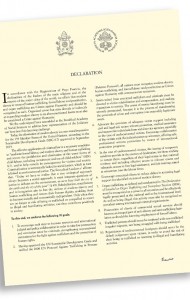In accordance with the Magisterium of Pope Francis, the declarations of the leaders of the main religions and of the mayors of the major cities of the world, we affirm that modern slavery in terms of human trafficking, forced labour and prostitution, and organ trafficking are Crimes against Humanity and should be recognised as such. Organized crime that aims directly or indirectly at expanding modern slavery in its abovementioned forms must also be considered a Crime against Humanity.
We the undersigned have assembled at the Pontifical Academy of Social Sciences to address how representatives of the Judiciary can best face this daunting challenge.
Today, the elimination of modern slavery is a new moral imperative for the 193 Member States of the United Nations, according to the Sustainable Development Goals (SDG 8.7) approved in September 2015.
The effective application of criminal law is a necessary condition to “eradicate forced labour, end modern slavery and human trafficking and secure the prohibition and elimination of the worst forms of child labour, including recruitment and use of child soldiers” (SDG 8.7), and to help remedy its consequences for victims and society. Criminal justice is intrinsically linked to social justice, which in turn is linked to environmental justice. The Encyclical Laudato si’ affirms that, “Today we have to realize that a true ecological approach always becomes a social approach; it must integrate questions of justice in debates on the environment, so as to hear both the cry of the earth and the cry of the poor” (§ 49). Rehabilitation, resettlement and re-integration aim to free the victims of modern slavery and human trafficking and restore their human dignity, enabling them to become socially and economically independent. Only when they are no longer at risk of being re-trafficked or compelled to resort to illegal and humiliating activities, can they contribute positively to society.
To this end, we endorse the following 10 goals:
- To encourage each state to increase resources and international judicial and police collaboration in order to raise low prosecution and conviction rates for criminals, strengthening supranational institutions for the fight against traffickers and the protection of human rights.
- Having approved the UN Sustainable Development Goals and ratified the 2000 UN Protocol Against Trafficking in Persons (Palermo Protocol), all nations must recognize modern slavery, human trafficking, and forced labour and prostitution as Crimes against Humanity with commensurate sentences.
- Assets seized from convicted traffickers and criminals must be devoted to victim rehabilitation and compensation, and making reparations to society. The crime of money laundering must be severely prosecuted, because it is the process of transforming the proceeds of crime and corruption into ostensibly legitimate assets.
- Advocate the provision of adequate victim support including civil and legal aid, secure witness protection, medical assistance and support for individuals from social service agencies, especially in the case of undocumented victims. Encourage collaboration of the victims with the judicial system as witnesses, offering safe, professional witness protection by means of international protection programs.
- In the case of undocumented victims, the issuing of temporary residence permits in the country of destination, for those wishing to remain there, regardless of their legal status in that national territory and including effective access to relevant courts and tribunals, access to free legal assistance, and job training aimed at reinsertion into the labour force.
- Encourage concerted efforts to reduce delays in accessing legal support for identified victims of modern slavery.
- Organ trafficking, as defined and condemned in The Declaration of Istanbul on Organ Trafficking and Transplant Tourism (2008), must be recognized as a crime in all countries and be effectively legally prosecuted at the national and at the international level. As well as being illegal, this activity must also be recognised as prevalent among international criminal organizations.
- Prosecution of clients of commercial sexual services should become an integral part of anti-slavery and anti-trafficking legis- lation as should the knowing employment of forced labour.
- Trafficked persons should never be confused with non-trafficked irregular migrants, nor being smuggled with being trafficked.
- Repatriation of undocumented foreigners should never be the default judgement upon victims, in order to avoid the risk of their being re-trafficked or resorting to illegal and humiliating activities.
Judges’ Summit on Human Trafficking and Organized Crime
Summit 3-4 June 2016 – As Isaiah prophesised long ago, “Peace is the fruit of justice” (cf. Is… Read more










